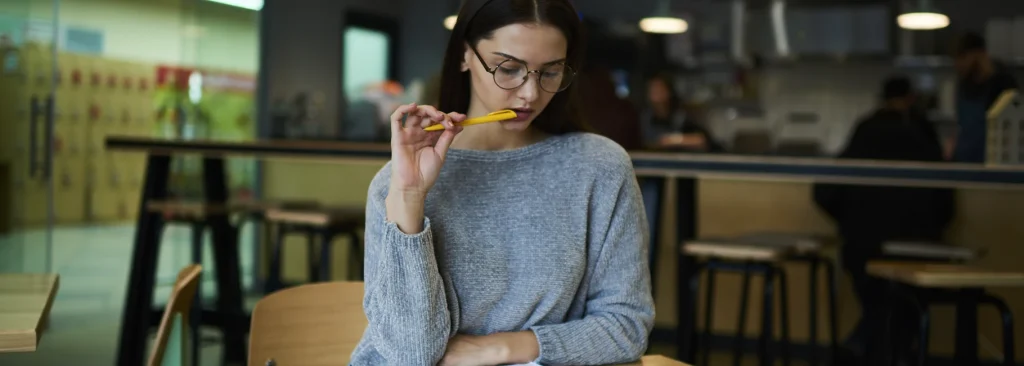If Harvard is one of your top-choice schools, you may be wondering how you can make your application stand out to the admissions committee. This is where your college essays come in. If done well, they can set you above other applicants. However, these essay prompts require short, creative answers, which is not an easy task. Keep reading to learn more about Harvard’s supplemental essays for the 2025-26 admissions cycle and how to craft them.
How Important Are the Harvard Supplemental Essays?
Writing a compelling personal essay as part of the Common Application or Coalition Application is one way for Harvard to get to know you. However, the additional prompts provided by Harvard University are meant for the admissions committee to learn even more about who you are, what you hope to get out of Harvard, and what contributions you can make to the campus community both personally and academically.
Most admissions committees, including Harvard’s, review applications holistically, which is why college essays matter. While academic performance is important, the other parts of your application, such as your essays and activities list, are what differentiate you from other students who submit comparable transcripts and test scores.
How Many Essays Does Harvard Require?
Students applying for admission to Harvard College — the undergraduate college at Harvard University — during the 2025-26 admissions cycle are required to respond to five supplemental essays. Each response should be no more than 150 words, so the challenge is to write a brief essay that tells a compelling story about you. Keep in mind that each response should convey something new and interesting about you that isn’t mentioned elsewhere in your application.
How Hard Is It to Get into Harvard?
Harvard is one of the most selective schools in the U.S. The acceptance rate for Harvard College was only 3.65% for the class of 2028, with similarly low admissions rates the previous few years. Understanding how to get into Harvard can help you prepare for the highly competitive admissions process. Ensuring you meet all the academic requirements and getting a head start on your essays can be crucial to your success.
When Should I Apply to Harvard?
Harvard offers both Restrictive Early Action (REA) and Regular Decision options. While applying early to college can sometimes help your chances of admission, you should only do so if you can submit a strong application. Many students opt to wait for the Regular Decision deadline to give themselves time to submit stronger grades and test scores.
The Harvard application deadlines are:
- November 1: Restrictive Early Action
- January 1: Regular Decision
REA applicants will receive a decision in mid-December. Students who applied RD will hear back at the end of March.
Learn more about the different types of Early Action and whether applying early is right for you.
Harvard Supplemental Essays 2025-26
These supplemental essays give you a good idea of what Harvard values, such as personal development, intellectual activities, and the positive impact you have made on your community. Your responses should demonstrate how your experiences, passions, and responsibilities have shaped you and influenced your view of the world. Let’s look at each prompt and how you might respond.
Supplemental Essay Prompt #1
Harvard has long recognized the importance of enrolling a diverse student body. How will the life experiences that shape who you are today enable you to contribute to Harvard?
Like many other colleges and universities, Harvard responded to the Supreme Court’s 2023 ruling on affirmative action by adding a prompt that allows students to discuss aspects of their background that may not be considered elsewhere in their application — like race, for example.
Your response to this essay should connect your experiences and life lessons with the ways you plan to contribute to the diverse campus community. Diversity can take many forms: religion, race, culture, sexual orientation, gender identity, way of thinking, etc. If you don’t feel like you fall into any of these categories personally, then write about how your experiences with diverse individuals and groups impacted you. The example below may help you think about ways to answer this prompt.
I have a profound responsibility: I’m a steward of the wild.
My community, nestled between national parks, taught me how to care for the wilderness. Wyoming Stargazing taught me that light pollution damages wildlife ecosystems. Neighbors leave no trace when backcountry hiking.
Educated and inspired by my community, I tear down barbed wire fences to reopen elk migration corridors. And, I encourage young gardeners to eliminate pesticides to improve soil biodiversity. Every day, I live and share my values: respect and protect.
So, Harvard, can we care for the wild together? Can you share what you’ve learned from the Rewilding Harvard Initiative, while I share what I know about small mammal highways? Then, let’s collaborate with the Urban Sustainability Lab to plant a micro-forest in a neglected lot. And together, we can build pollinator gardens and install nesting boxes to attract your Eastern bluebirds. Together, we can steward the wild.
Supplemental Essay Prompt #2
Describe a time when you strongly disagreed with someone about an idea or issue. How did you communicate or engage with this person? What did you learn from this experience?
Colleges like Harvard are looking for students who can engage with others thoughtfully and respectfully, even when opinions clash. View this prompt as an opportunity to demonstrate your critical thinking, communication skills, and maturity. The admissions committee is interested in how you navigate conflicts, particularly when dealing with differing perspectives. This could involve debates on social, political, or personal issues, or disagreements in a collaborative setting like a group project.
When responding, focus on showing your ability to listen, articulate your own views, and engage in constructive dialogue. Highlight your personal growth, revealing how the experience shaped your understanding of others and improved your ability to work in diverse environments — qualities that are valuable in a college setting.
Emerging from COVID, our headmaster emphasized athletics heavily. As a cross-country runner, I value athletics, but sidelining the arts—the heart of our school’s identity—felt like a loss. Months of advocacy, including efforts I felt missed the mark, failed until I saw an opportunity. Invited to perform an award-winning speech for the board, I agreed on one condition: five minutes to advocate for the arts. Those five minutes expanded into a thirty-minute discussion.
Listening to the board’s goal of revitalizing school spirit through athletics, I acknowledged their concerns while demonstrating how investing in the arts could also unify us. This collaboration led to the creation of an arts council and a renewed focus on the arts.
I learned that progress often begins with a simple conversation and that big changes grow from small discussions rooted in common goals.
Supplemental Essay Prompt #3
Briefly describe any of your extracurricular activities, employment experience, travel, or family responsibilities that have shaped who you are.
This is a chance to dive deeper into one of the bullet points on your activities list. Choose one that had a profound effect on you, especially if it represents what you’re passionate about. You are likely to see similar supplemental essay questions for other schools, so make sure you tailor your response to make it specific to Harvard, if applicable. The following example can give you an idea of how you might approach this essay.
Around mile ten, two runners dressed as Easter bunnies came up fast on my left, pink ears bobbing. This was the Hop Hop Half Marathon where runners ate Peeps instead of Gu Energy Gels. It’s one of the races in my personal Half Marathon Challenge: 50 races. 50 states. 50 months.
Halfs are grueling. Dehydration and busted knees are real. The challenge has cultivated my grit.
But, I don’t run just because I like achieving hard things; I’m chasing community. Runners cheer each other with cowbells and lift each other up if we fall. And, when 200 Elvises cross the next finish line (Viva Las Vegas!), that’s the good stuff.
Runner energy runs with me on the trail, on the court, on the stage, and on the team. It’s positive energy that creates community and helps the whole crew move, especially when the task is tough.
Supplemental Essay Prompt #4
How do you hope to use your Harvard education in the future?
Your response to this prompt will require you to conduct research about academic programs, faculty, and opportunities at Harvard. It may be challenging to imagine how you’ll apply your college education to the real world, so think about your current goals and the learning outcomes for your program(s) of interest. How are they relevant to your future career and/or in everyday life? Use the example below as inspiration.
Surgery, radiotherapy, chemotherapy, immunotherapy. The scientific community has innovated numerous cancer treatments across centuries, yet there is no universal cure. A Harvard education would provide me with a strong understanding of existing therapeutics as I aspire to design novel treatments. I’d start in Professor Ruth Franklin’s first year seminar, The Cure Within: Fighting Cancer with Your Immune System, which features a trip to a Dana Farber tumor immunology lab where I can see the treatments I’ve researched in real-time.
I have already been deeply invested in pushing the boundaries of cancer immunology by researching the impact of peri-treatment steroids on white blood cells and exploring how machine-learning can predict immunotherapy outcomes. In the future, I hope to revolutionize how pharmaceutical companies produce and distribute immunotherapies. Treatment should be available to everyone, and my goal is to make immunotherapies more accessible to lower-income communities by designing more efficient and cost-effective treatments.
Supplemental Essay Prompt #5
Top 3 things your roommates might like to know about you.
This is an opportunity to be a little less formal in your response — just remember that the admissions committee is reading this. What do you want them to know about you in terms of your personality, daily habits, purpose projects, hobbies, etc.? This is an opportunity to share things that aren’t mentioned anywhere else on your application so the committee can get a little more insight into who you are and what makes you tick.
You may often find me with my nose in a worn-out black book, held together by strings and stickers: this is my sketchbook! Art allows me to explore interests, process emotions, and capture experiences—from vibrant, animated manga characters brought to life by alcohol markers, to charcoal reproductions of Delhi’s charmingly dilapidated forts and clumsily stacked roadside stands.
I’m always up for a game of chess (or ten!). Some of my closest friendships formed over the chess board, and I’d love to get to know you as I counter your Queen’s Gambit with my Nimzo-Indian Defense.
To fuel our late-night study sessions, I’ll bake us my grandmother’s shortbread cookies, which pair perfectly with a dabarah of steaming hot Madras-style filter coffee. In India, each family develops its own cuisine, and through cooking, I experiment with unique flavours and create my own intricacies, fusing age-old family secrets with modern, multi-cultural ingredients.
Get Essay Guidance with IvyWise
If writer’s block is keeping you from responding to your essay prompts, get personalized help from a professional college counselor. IvyWise college admissions counselors have served as Directors and Deans of admissions at some of the most elite colleges in the world, so they know how to craft essays that make you stand out.
Get Started




